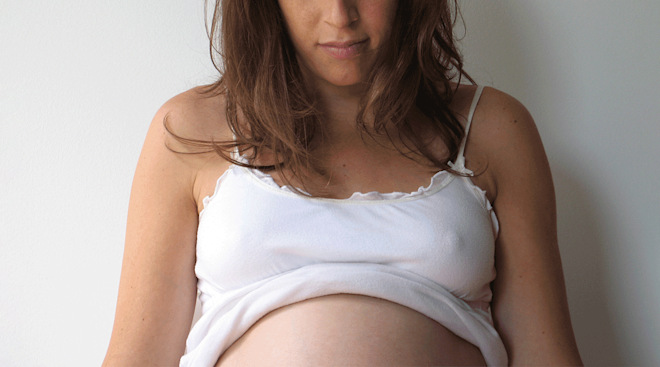How to Get Relief From Dry Skin During Pregnancy
Pregnancy may come with lots of frustrating and uncomfortable side effects, but you’d think the so-called “pregnancy glow” would be one thing to look forward to. Unfortunately, your complexion (and body) might be feeling less than dewy and hydrated these days. So what’s up with feeling more reptilian than radiant? Dry skin during pregnancy is more common than you might think, so if you’re feeling drier than a molting lizard as your pregnancy progresses, know that you’re not alone. Read on to learn how you can get relief from pregnancy dry skin.
The chief culprit of dry skin during pregnancy is—you guessed it—hormones. Yes, those pesky hormones work in a few different ways to keep your skin feeling dry and tight despite your coveted skin care routine. Abigail Waldman, MD, director of the Mohs and Dermatologic Surgery Center at Brigham and Women’s Hospital in Boston, explains that the production of sebum, the natural oil of your skin that’s regulated by androgen hormones, is inhibited by high levels of estrogen during pregnancy.
In addition to the increased estrogen levels, another hormone called vasopressin is also elevated, explains Susan Crowe, MD, an ob-gyn and clinical professor at Stanford Medicine Children’s Health in California: “This hormone has a physiologic purpose as well. It helps to retain the additional fluid pregnant people need in their blood volumes, but by doing so, it can decrease the hydration to the skin.”
Luckily, there are lots of different things you can do to keep your skin hydrated during pregnancy, and most of them are pretty simple. Below, some tips for relieving dry skin during pregnancy:
- Drink plenty of water. It’s important to stay hydrated during pregnancy. “Blood volumes are increasing in order to meet the needs of a growing fetus, and the body’s need for fluid is very high,” says Crowe.
- Cut down on caffeine. According to Crowe, it helps to avoid or limit caffeine because caffeinated beverages are dehydrating.
- Take cool showers instead of hot. Limit your exposure to very hot water by taking shorter showers or using lukewarm water to help maintain your skin’s natural moisturizing processes, advises Crowe.
- Use moisturizer. Apply liberally whenever you feel like you need it. “Symptoms may be worse in areas that are stretching quickly, so be sure to include the belly when using moisturizers,” advises Crowe. “Look for key moisturizing ingredients like dimethicone, ceramides and hyaluronic acid,” Waldman suggests. Additionally, an ointment like Vaseline or Aquaphor can help seal in moisture.
- Use gentle products. Limit fragrances in soaps, skin products and laundry detergent, avoid dryer sheets and wear non-irritating clothes like cotton and synthetic materials, Waldman suggests.
Dry skin in pregnancy is common and harmless. Unfortunately, it also isn’t entirely preventable. By following the tips our experts provided above, you should be able to manage your pregnancy dry skin so it isn’t itchy and irritating. In short, stay hydrated, nourish your skin and take steps to keep yourself feeling cool and comfortable.
If the dryness spreads from your abdomen to your arms and legs and is accompanied by red, itchy or raised patches, it could be a condition called PUPPP (pruritic urticarial papules and plaques of pregnancy). It’s usually more annoying than anything else and will go away after delivery, but your doctor may be able to prescribe medication to ease your symptoms.
Extremely dry skin in pregnancy can also be a sign of dehydration. And that’s a problem, since being dehydrated can increase the chances of preterm labor. You should always mention any skin changes to your OB or midwife, so they can rule out any other health problems.
It’s normal for your skin to feel drier than usual while you’re pregnant. Not only are your hormones constantly shifting, your skin stretches quite a bit to accommodate a growing human. Luckily, pregnancy dry skin can almost always be managed with just a few simple lifestyle changes, like drinking more water, using a thicker moisturizer and applying it more frequently. If you’re still suffering from dry skin after trying these remedies, or you notice a sudden increase in how itchy your skin feels, reach out to your provider.
Please note: The Bump and the materials and information it contains are not intended to, and do not constitute, medical or other health advice or diagnosis and should not be used as such. You should always consult with a qualified physician or health professional about your specific circumstances.
Susan Crowe, MD, is an ob-gyn and clinical professor at Stanford Medicine Children’s Health in California. She earned her medical degree from Loyola University Stritch School of Medicine in Maywood, Illinois.
Abigail Waldman, MD, is director of the Mohs and Dermatologic Surgery Center at Brigham and Women’s Hospital in Boston. She earned her medical degree from the Yale University School of Medicine in New Haven, Connecticut.
Navigate forward to interact with the calendar and select a date. Press the question mark key to get the keyboard shortcuts for changing dates.




















































